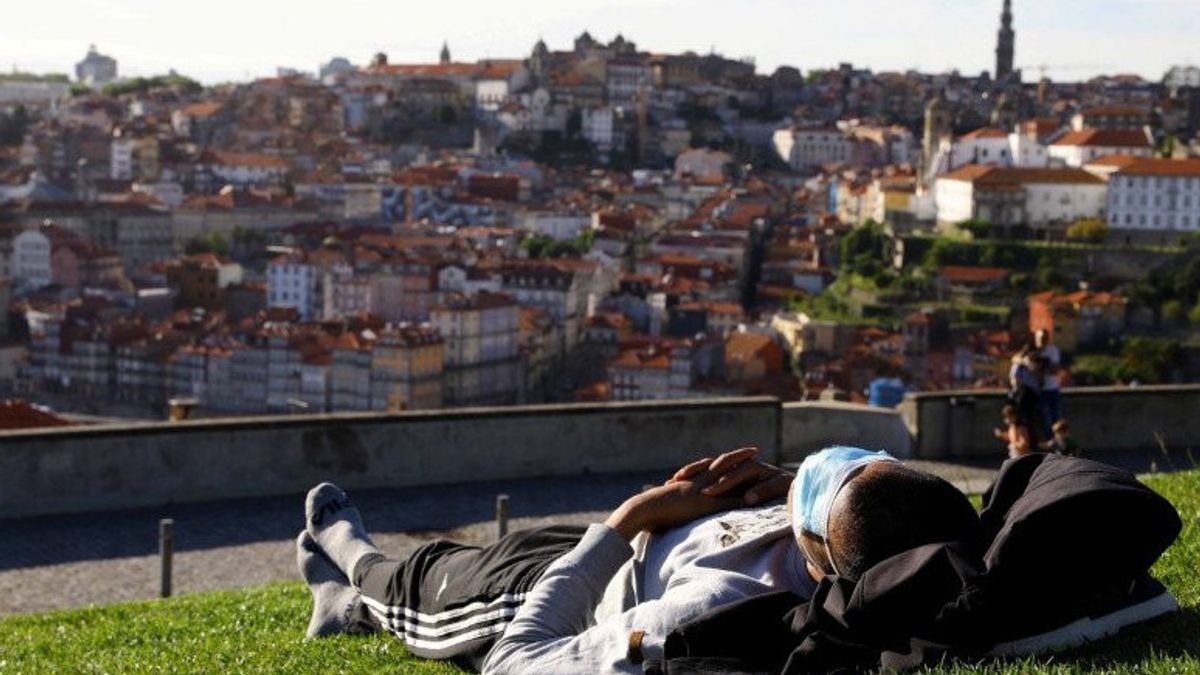JAKARTA - The coronavirus that emerged at the end of December 2019 in the city of Wuhan, central China, has yet to subside. More than 200 countries and territories around the world have reported the presence of the virus.
Scientists in big countries such as the United States, China, Russia, Germany, and the UK are competing to develop a COVID-19 vaccine, which is considered to be one of the weapons to fight the pandemic.
As reported by the Worldometer website, as of December 19, 2021, there were 80,420,257 cases and 1,484,587 deaths of COVID-19 in Europe since the start of the pandemic. Meanwhile, the total number of patients in Europe who recovered from the disease reached 70,296,397.
Over the past three months, new cases of COVID-19 in Europe have slowly increased again. It's almost ferocious. This condition is exacerbated by the presence of a new variant of the coronavirus called Omicron, which was discovered in South Africa at the end of November and was designated by the WHO as a variant to be wary of.
According to the website, Europe, the United Kingdom, and France, reported more than 50,000 new cases of COVID-19 on December 19. Russia, Germany, Italy, Poland, and the Netherlands also recorded more than 10,000 new cases.
Ukrainian, Czech, Belgian, Portuguese, Irish, and Danish health authorities reported more than 5,000 additional cases of COVID-19. Meanwhile, more than 1,000 new cases were reported in Serbia, Austria, Greece, Slovakia, Belarus, Croatia, Lithuania, Slovenia, and Norway.
Russia has the most reported COVID-19 deaths, with 1,076 daily deaths, followed by Poland with 543 deaths.
The United Kingdom is the country with the highest total number of COVID-19 cases in Europe, with 11,279,428 cases. Meanwhile, Vatican City is the country with the lowest COVID-19 cases on the continent, at 27.
COVID-19 Vaccination
According to WHO data, globally, 4,364,023,441 people have received the first dose of the COVID-19 vaccine and 3,480,200,920 people have received the second dose.
Reporting from the ourworldindata website as of December 17, European countries that have given COVID-19 vaccines for more than 80 percent of their population are Portugal, Malta, Iceland, and Spain.
Denmark, Ireland, Belgium, the Netherlands, Finland, Italy, Sweden, France, and Norway have all vaccinated more than 70 percent of their population.
Meanwhile, Germany, Austria, United Kingdom, Luxembourg, Lithuania, Cyprus, Liechtenstein, Latvia, Switzerland, Greece, Andorra, San Marino, Hungary, Estonia, Czech Republic, Slovenia, Poland, and Croatia have injected COVID-19 vaccines for more than 50 percent of the population.
The authorities of Serbia, Slovakia, Kosovo, Russia, Montenegro, Romania, North Macedonia, Albania, and Belarus report that less than 50 percent of their population has been vaccinated against COVID-19. Then the governments of Ukraine, Bulgaria, and Moldova have not yet vaccinated 30 percent of the population.
In order to increase efforts to fight against COVID-19, a number of countries in Europe have also accelerated the vaccination of children aged 5-11 years in the midst of a surge in new cases of COVID-19.
On November 25, 2021, the European Drug Administration (EMA) approved the Pfizer-BioNTech vaccine for the same age group. However, these children will be given a lower dose than their peers over the age of 12. In the European Union there are about 27 million children from the age group 5-11 years.
A number of Austrian provinces including the capital Vienna began vaccinating children of the same age group, even before the EMA approval. On 15 November 200 children in Vienna were given a dose of the vaccine.
Then, the Hungarian authorities began vaccinating children aged 5-11 years on December 14. So far 38,000 children have been injected with the vaccine, while 77 hospitals across the country are still continuing the program.
In Greece, vaccination of children aged 11-15 years started on December 15 and so far there have been more than 30,000 appointments for vaccination.
Spanish authorities began vaccinating children aged 5-11 years on 15 December. The local Ministry of Health announced that 1.3 million doses of Pfizer-BioNTech's COVID-19 vaccine have so far been received for children. According to the ministry, the administration of the first dose of the COVID-19 vaccine to all children in that age group will take place at the end of January.
On 15 December France began vaccinating children of the same age group, which it deemed "at-risk". Recorded there are about 360,000 children in the country. Vaccination of all children in the 5-11 year age group is planned to begin after December 20.
Meanwhile, the German Vaccination Standing Committee (STIKO) suggested a vaccine made by Pfizer-BioNTech for the same age group on December 9. After reviewing the data, STIKO decided to recommend a COVID-19 vaccine for children aged 5-11 years with various diseases.
On December 10 the Swiss health authority, Swissmedic, approved the Pfizer-BioNTech vaccine for children aged 5-11 years. However, vaccination is expected to start in the first week of January 2022.
The Belgian government is awaiting recommendations from the country's health council before officially launching a child vaccination campaign. Authorities are expected to announce the decision on December 20.
Another effort to fight COVID-19 is the provision of booster vaccines. A number of countries in Europe have injected booster vaccines. Health workers who are on the front lines against COVID-19 and vulnerable groups are a priority in the booster vaccine program.
In Spain, authorities have given a third dose of the COVID-19 vaccine to people aged 60 and over and are expanding its reach as cases soar. About 10 million people in Spain have already received the booster vaccine. Local authorities on December 16 approved a booster vaccine for people aged 40 years and over. Previously, the age limit for the third dose of vaccination was 70 years and over.
Then, the Swiss Government on October 26 also suggested a COVID-19 booster vaccine for the elderly aged 65 years and over but not for the general public. The third vaccine was started in mid-November. Switzerland has enough vaccines to give to all eligible patients for the booster vaccination and to all those who have not received the vaccine during 2021-2022.
Meanwhile, French President Emmanuel Macron on November 9 stated that citizens aged 65 years and over from mid-December would be required to show proof of having received a COVID-19 booster vaccine. According to him, the booster vaccine, which has been only available for the population aged 65 years and over and the vulnerable, can be obtained from the beginning of December by the 50-64 year age group.
Refusal of COVID-19 vaccination
A crowd of more than 4,000 health workers in Brussels, Belgium, on December 7, 2021, staged a protest against the federal government's decision that all medical staff should be vaccinated.
Health workers who refuse to be injected with vaccines will be fined and possibly suspended. The crowd denounced mandatory vaccination as "discrimination" and an "unproductive" measure. Some of the demonstration placards read "we must put common sense" and "let's save our health system instead of firing staff".
On November 19, the federal government passed a law on mandatory vaccination of health workers. As of January 1, 2022, care staff will be given three months to be injected with the vaccine. As of April 1, if the decision is not implemented, the visa or staff registration number will be revoked and they may therefore be terminated.
Sad Stories
The coronavirus pandemic has incised many sad stories.
Reuters wrote that a man named Marcel Meys, who was 112 years old and believed to be the oldest person in France, died of COVID-19. Meys breathed his last on December 15 at a hospital in Vienne in the Rhone Alpes region of Auvergne, France.
He was taken to the hospital and put on oxygen aids after his health condition at home deteriorated. Meys is reportedly not vaccinated and lives alone in her home in Saint-Romain-en-Gal, which has been occupied since 1957. The Rhone Valley native was born in July 1909.
Then, on September 8 at least 10 people died when a fire broke out at a makeshift hospital for COVID-19 patients in the city of Tetovo, North Macedonia. Local media showed images of a huge blaze at a hospital in the west of the city as firefighters rushed to the scene. It was not clear how many patients were in hospital when the fire broke out around 9pm local time.
A month later, on October 1, a fire engulfed the ICU at a COVID-19 referral hospital in Romania, killing nine people. Firefighters managed to extinguish the blaze at the hospital in the city of Constanta at around 0755 GMT, after engaging additional officers from nearby areas.
Video footage shows patients jumping from lower-floor hospital windows. Health Minister Cseke Attila said 113 patients were at the hospital when the fire broke out, including 10 patients in the ICU. Earlier in February, four patients died in a fire at a COVID treatment hospital in the nation's capital, Bucharest.
The fire incident occurred again. On September 11 the COVID-19 referral hospital in the Romanian city of Ploiesti caught fire, killing two patients and injuring a nurse. The fire, which was immediately extinguished, broke out at around 0200GMT and scorched one room. A total of 15 patients who were at the location were transferred to another hospital.
The English, Chinese, Japanese, Arabic, and French versions are automatically generated by the AI. So there may still be inaccuracies in translating, please always see Indonesian as our main language. (system supported by DigitalSiber.id)













